|
|
|
Sort Order |
|
|
|
Items / Page
|
|
|
|
|
|
|
| Srl | Item |
| 1 |
ID:
153486
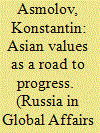

|
|
|
|
|
| Summary/Abstract |
The modern world's structure is not only explicitly pyramidal, but it is also very rigid. Only a few Second or Third world countries could make it into the First World after they had speedily modernized themselves. By accident or coincidence, all such countries happen to be in the Confucian cultural region. The most obvious example is the Republic of Korea, which in the early 1960s was behind Nigeria in terms of development but which by the beginning of the current economic crisis aspired to be among the top ten most developed countries. Singapore and Taiwan showed impressive economic growth rates, and now Vietnam and the Peoples Republic of China are following suit.
|
|
|
|
|
|
|
|
|
|
|
|
|
|
|
|
| 2 |
ID:
153488
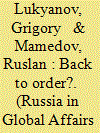

|
|
|
|
|
| Summary/Abstract |
In November 2016, the Command of the Syrian Army announced the creation of a new military force, the Fifth Assault Corps. Since the Russian Aerospace Forces began their military operation in Syria in the fall of 2015, this is the second attempt to strengthen, qualitatively and quantitatively, the Syrian regular army which has been involved in an armed conflict for many years. Earlier, with Russia's and Iran's active support, the Fourth Corps was formed in addition to the earlier established First, Second and Third Corps. The emergence of the new military force has aroused great interest both in Syria and beyond. Observers representing different parties to the conflict are interested not only in factors that were behind the formation of the Fifth Corps but also in its mission. Given the lack of reliable information and the abundance of rumors surrounding the new force, we can only say that its emergence reflects several complex and ambiguous tendencies characterizing the development of the armed forces and the military-political situation in Syria and the transformation of regional approaches to the organization and control of military power in the Middle East as a whole.
|
|
|
|
|
|
|
|
|
|
|
|
|
|
|
|
| 3 |
ID:
153484


|
|
|
|
|
| Summary/Abstract |
Wide-ranging discussions have only recently begun concerning the turn towards conservative values in Europe. In fact, one of the first signs of this change was the general election in the Netherlands in 2010, when the ultra-right People's Party for Freedom and Democracy won 24 seats in the Dutch parliament to become the third largest political force in the country. The right-wing trend gained momentum from 2014-2016: any vote in European countries added influence to forces whose rhetoric focused on strengthening the nation state, criticizing integration processes, and complaining about the globalization of all aspects of life.
|
|
|
|
|
|
|
|
|
|
|
|
|
|
|
|
| 4 |
ID:
153480
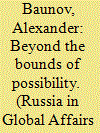

|
|
|
|
|
| Summary/Abstract |
The Democrats who lost the 2016 elections and Donald Trump who beat them are much more alike in their talk and deeds than one might think. Both told their respective electorates that the U.S. had fallen victim to hostile foreign forces. Apparently, the problem is not that the Democrats have suffered a defeat, but that the U.S. has lost sight of the limits to what it can do in the world.
|
|
|
|
|
|
|
|
|
|
|
|
|
|
|
|
| 5 |
ID:
153489
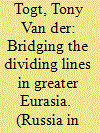

|
|
|
|
|
| Summary/Abstract |
In recent years, we have witnessed increased competition and divergence in development between two forms of regional integration, the European Union (EU) and the Eurasian Economic Union (EEU). This reached a climax in the Ukraine crisis, the most important geopolitical conflict between Russia and the West in the post-Soviet space. Geopolitics is back with a vengeance and now also has serious geo-economic consequences.
|
|
|
|
|
|
|
|
|
|
|
|
|
|
|
|
| 6 |
ID:
153485
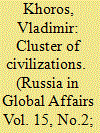

|
|
|
|
|
| Summary/Abstract |
The time is ripe for delving into how civilizations are getting along and keeping in touch with each other in the global era. In looking for the causes of multiplying conflicts it is not enough to point to global economic and geopolitical contradictions alone. The civilizational aspect is crucial as well. It aroused particularly keen interest in the last quarter of the twentieth century. In Russia, this interest stemmed largely from the need to refurbish the less attractive theory of social formations or replace it with something more relevant. Samuel Huntington's article (subsequently a book) played a big role in invigorating the civilizational discourse. His initiative induced the emergence of quite a few meaningful works on the problems of civilizations in many countries, including Russia.
|
|
|
|
|
|
|
|
|
|
|
|
|
|
|
|
| 7 |
ID:
153487
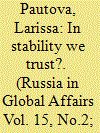

|
|
|
|
|
| Summary/Abstract |
Stability is invariably present among Russians' most precious values. According to the Public Opinion Foundation (FOM)'s 2013 findings, stability is above law, democracy, human rights, dignity, conscience, spirituality, and even success. Its significance has since gone up from 21% to 27%.
|
|
|
|
|
|
|
|
|
|
|
|
|
|
|
|
| 8 |
ID:
153478
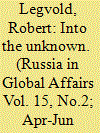

|
|
|
|
|
| Summary/Abstract |
Russian and U.S. leaders, as they contemplate what next in the wake of the U.S. presidential election, are not only making their choices as the ground under them churns, the choices they make, whether they realize it or not, will bear directly on how dystopian the coming global order will be. The context for contemplating the possible direction U.S.-Russian relations may take is clouded not only by the tumult in the world outside, but by the political watershed the United States is now entering. Like the transformation recasting the international setting, the denouement of this passage will not come soon.
|
|
|
|
|
|
|
|
|
|
|
|
|
|
|
|
| 9 |
ID:
153482


|
|
|
|
|
| Summary/Abstract |
During the recent U.S. presidential campaign, many political analysts and politicians talked about a "big deal" between Russia and the West if Donald Trump won the White House. Even if not exactly disposed towards Russia, Trump certainly does not display the traditional Anglo-Saxon anti-Russian hostility. The talk included the conflict in Ukraine, which could also be called an Eastern European clash. The deal itself, or rather talk of it, became an acceptable reality when clever geostrategists from various countries, especially the United States, came to the conclusion that the rivalry between Russia and Europe over Ukraine joining the Eurasian or European economic bloc may lead not only to the disintegration of Ukraine (which became a de facto reality in February 2014), but also to a full-scale military conflict over "the Ukrainian inheritance."
|
|
|
|
|
|
|
|
|
|
|
|
|
|
|
|
| 10 |
ID:
153490
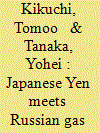

|
|
|
|
|
| Summary/Abstract |
How can Russia and Japan cooperate to contribute to stability and prosperity in the Asia-Pacific region? With 48 trillion cubic meters Russia has the world's largest natural gas reserve while Japan has the world's largest net foreign asset of $3.2 trillion. Linking the two affluent resources creates new transactions and opportunities for the world economy. The implication will be far-reaching beyond the sphere of mere economics and will change the energy and financial world dominated by oil from the Middle East and the USD. For example, Japan imports 82% of its oil from the Middle East--Saudi Arabia (34%), UAE (25%), Qatar (8%), Kuwait (8%), and Iran (5%). On the other hand, the USD is used for 42.09% of international payments and is dominant particularly in Asia where regional currencies such as the Japanese yen (JPY) and the Chinese yuan (CNY) are used only for 3.4% and 1.68% of international payments, respectively.
|
|
|
|
|
|
|
|
|
|
|
|
|
|
|
|
| 11 |
ID:
153476


|
|
|
|
|
| Summary/Abstract |
A specter is haunting the world, a specter of something new which no one can comprehend at this point. It has been a long time since the world faced a situation of such all-pervading uncertainty, when no one can clearly determine even the nature of ongoing changes. The terms used to describe them, such as 'populism,' 'new mercantilism' or 'a crisis of the liberal order' are of little help.
|
|
|
|
|
|
|
|
|
|
|
|
|
|
|
|
| 12 |
ID:
153477
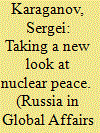

|
|
|
|
|
| Summary/Abstract |
Key points at first. Nuclear weapons, if they are ever to be used, are unspeakable evil, but their existence saved the world during the Cold War and is saving it now as the previous two global systems--the bipolar one (which died, but there have been attempts to revive it) and the "unipolar moment" (which is fast winding down now)--are simultaneously falling apart. These two processes have coincided with breathtakingly rapid changes in the balance of power on the global economic and political scene, the crisis of international law and in the rules of decency in international relations, and chaos in the minds of elites in many countries. The situation is exacerbated by the start of arms race in BMD and by new conventional strategic arms. It is highly likely that we are moving towards a situation where cyber weapons start to play a role of weapons of mass destruction.
|
|
|
|
|
|
|
|
|
|
|
|
|
|
|
|
| 13 |
ID:
153479


|
|
|
|
|
| Summary/Abstract |
The risk of Russia's involvement in low-intensity military conflicts has been growing since the early 2000s. Instability along many stretches of the border has forced Moscow to increase its military presence in the neighboring areas. Russia has military bases in high conflict risk areas, notably South Ossetia, Abkhazia, Moldova, Armenia, Kyrgyzstan, and Tajikistan. Russia can ill afford to take a let-it-drift approach to developments in Afghanistan, Syria, and Ukraine, and is likely to be drawn into a potential confrontation on the Korean Peninsula or in Iran, and in a possible escalation of the conflict in Ukraine.
|
|
|
|
|
|
|
|
|
|
|
|
|
|
|
|
| 14 |
ID:
153483
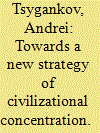

|
|
|
|
|
| Summary/Abstract |
Russian foreign policy successes in the Middle East have created new and more favorable conditions for Russia. These accomplishments include the proactive assertion of independence in the realm of mass media and humanitarian values, development of relations with China and a number of non-Western countries, and stimulatioin of profound changes in the world. The continuing disintegration of the liberal world order and the turn of the West towards national interests and conservative values, which began with Brexit and Donald Trumps victory in the U.S. presidential election, have made it possible for Russia to search for new partners with ideals closer to its own. In this context calls have been more frequent for pushing ahead with a vigorous foreign policy and formalizing a new world order approximating the Congress of Vienna model. In these circumstances, it is important to reconsider the goals and capabilities of Russia as a country with its own, special system of values that takes a unique geopolitical position.
|
|
|
|
|
|
|
|
|
|
|
|
|
|
|
|
| 15 |
ID:
153481


|
|
|
|
|
| Summary/Abstract |
The decision of the new U.S. Republican administration to give up one of the most ambitious trade and economic projects--Trans-Pacific Partnership (TPP)--signified a shift in Washington's Asian policy. For the American allies and competitors in the Asia-Pacific region this means uncertainty and new risks. Yet this may be a move intended to change the look of the policy, leaving its essence intact.
|
|
|
|
|
|
|
|
|
|
|
|
|
|
|
|
|
|
|
|
|